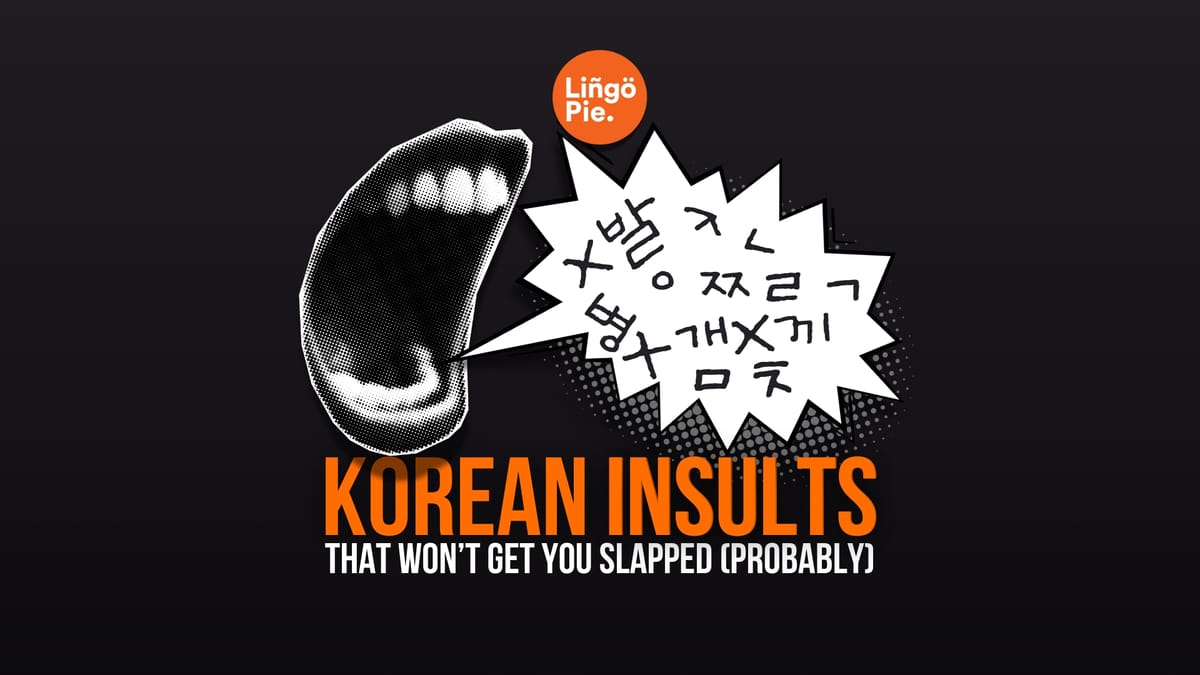Ever been watching a Korean drama when suddenly the mild-mannered protagonist explodes with words that make the subtitles go [angry muttering] or [cursing]? What did they actually say? Since you're in this post, I can only assume one thing: You are curious! Whatever your reason is for learning these spicy words, please don't call your Korean native speakers a 바보 just because you can.
Remember, this Asian language has cultural nuances that don’t always translate well. What might seem like a mild joke to you could be genuinely offensive to a Korean speaker. So while this article will teach you some spicy language, remember:
- Know your audience
- Understand the context
- When in doubt, keep it to yourself
Now that we’ve got that out of the way, let’s learn Korean insults across the spectrum from "mildly annoying" to "never say this unless you want to start a fight."
- Konglish: 30+ Korean Loanwords You Never Knew Existed
- 30+ Korean Last Names You Probably Heard In K-Dramas
- 7 Phrases To Ask How Are You In Korean With Answers

Why Learn Korean Insults, Anyway?
If you’re going to understand authentic Korean media or conversations with native speakers, you’ll need to know what these words mean (even if you never use them yourself). If you need more convincing, here are 3 solid reasons to learn Korean insults:
- Media comprehension: Korean movies, dramas, and music often include insults and slang that won't appear in textbooks
- Cultural insights: Insults reveal what a society considers taboo or offensive
- Self-defense: Knowing when someone is insulting you is pretty darn useful
So what does the law say?
Under Korean law, specifically the Criminal Act (형법):
- Insult (모욕죄): You can be charged for insulting someone publicly, even without using swear words, if it damages their social reputation or dignity. That's another reason to be aware if someone curses you in korea.

Mild Korean Insults
These are the training wheels of Korean insults. They might get an eye roll or a light smack on the arm, but they probably won't end a friendship.
바보 (babo)
The Korean equivalent of "dummy" or "fool," this is perhaps the mildest insult in the Korean language. It's commonly used among friends and family members, similar to calling someone "silly" in English.
As for pronouncing this Korean insult, note that the "b" sound in 바보 is softer than in English. It's somewhere between a "b" and "p" sound.
- "야, 바보야! 그게 아니라고!" (Ya, babo-ya! Geuge anirago!) – "Hey, dummy! That's not it!"
멍청이 (meongcheongi)
Slightly stronger than 바보, this translates to "idiot" or "blockhead." It's still relatively mild but carries more bite, especially when said with an edge in your voice.
- "너 진짜 멍청이구나." (Neo jinjja meongcheongi-guna.) – "You really are an idiot."
답답해 (dapdaphae)
This isn't exactly an insult but more of an exasperated expression meaning "it's frustrating". It's what someone might say when you're not understanding something obvious.
- "아, 답답해! 이렇게 하라고!" (Ah, dapdaphae! Ireoke harago!) – "Ugh, this is frustrating! Do it like this!"
짜증나 (jjajeungna)
Another expression of frustration rather than a direct insult, this means "annoying" or "irritating." It's often directed at situations rather than people, though it can be used for both.
- "진짜 짜증나네." (Jinjja jjajeungna-ne.) – "This is really annoying."
내가 왜? (naega wae?)
Literally “Why me?” but used more like “Why should I?” or “What does this have to do with me?”It has that passive-aggressive, annoyed tone. It can be funny in the right moment, but also comes off bratty if used wrong.
It’s like when someone asks you to do something you have zero interest in:
“Go clean that up.” → “내가 왜?”
(Pro tip: delivery is everything here.)

Medium-Strength Korean Insults
Now we're entering territory where you should tread carefully. These words can be used among close friends in certain contexts, but could cause offense in others.
똥멍청이 (ttongmeongcheongi)
Take "idiot" and add "poop" in front of it and you get this colorful expression. It literally means "poop idiot" – childish but with more punch than the milder insults above.
찐따 (jjindda)
A slang term for someone who's socially awkward or an outcast. It has become more mainstream in recent years, but still carries a sting, similar to calling someone a "loser" or "weirdo" in English.
한심해 (hansimhae)
This expression means "pathetic" or "pitiful." It's used when someone's behavior is disappointing or beneath expectations, carrying a tone of judgment.
지랄 (jiral)
A versatile insult used to call out someone's nonsense or ridiculous behavior. It originally referred to symptoms of seizures or neurological disorders but has evolved to mean "bullshit" or "talking nonsense."
Feeling really pissed? You can add 개 (dog) in front to make 개지랄 for a stronger impact.
뻔뻔해 (ppeonppeonhae)
When someone is shamelessly brazen or has the audacity to do something inappropriate without remorse, this term meaning "shameless" might come up.
그리기 쉽게 생겼다 (geu-ri-gi swi-ge saeng-gyeot-da)
This is a super sassy insult that literally means “You look easy to draw.”
Sounds harmless? It’s code for: your face is basic, plain, cartoonish — even ugly. It’s sarcastic and creative, like a backhanded slap in slang form.
If you ever see this in a K-pop roast or meme comment, just know... they’re not complimenting someone’s symmetry. 😬
개 같네 (gae gat-ne)
Literally “like a dog,” this is a super common insult that’s often used in frustration: “This situation is 개 같네 (gae gat-ne)...”
It’s like saying “This is so messed up” or “That guy’s such a jerk.”
“개” (gae) or “dog” is used to intensify a lot of expressions in Korean, not just as an insult to people, but to add emotion.
It’s not as harsh as calling someone a 개새끼, but still not something you'd say to your boss.

Strong Korean Insults
These are words you should generally avoid using unless you're very comfortable with the Korean language and culture. They can be deeply offensive, especially to people you don't know well.
개새끼 (gaesaekki)
One of the most common Korean insults, this is equivalent to "son of a bitch" in English. The word 개 (gae) means "dog," and when combined with 새끼 (saekki), which means "offspring" you get a pretty vivid insult.
미친놈/미친년 (michinnom/michilyeon)
Meaning "crazy bastard" and "crazy bitch" respectively, these gendered insults are considered quite offensive. 미친 (michin) means "crazy," while 놈 (nom) and 년 (nyeon) are derogatory terms for men and women.
Despite not sounding too harsh in direct translation, these terms are considered extremely rude in Korean culture and should be avoided in most contexts.
씨발 (ssibal)
This is the Korean equivalent of the F-word – versatile, commonly used, and definitely not something you want to say in polite company. Like its English counterpart, it can function virtually in any part of speech.
Literally meaning "like a penis," this vulgar expression is used to describe something terrible or frustrating. It's a versatile insult that can be applied to situations, objects, or people's behavior.
Careful with this one — the Korean word for 18 is 십팔 (ship-pal), and you really gotta make that second syllable soft and airy. Same goes for the word for shoes, 신발 (shin-bal). If you mess up the pronunciation, especially by stressing the 'pal' or 'bal' too hard, you might accidentally sound like you're saying 씨발 (ssi-bal), which is a pretty harsh curse word, without noticing. Luckily, if you are foreign looking (or foreign sounding) they will probably cut you some slack (sighs in relief).
꺼져 (kkeojyeo)
A sharp command meaning "get lost" or "buzz off." It's frequently used in Korean dramas and movies, especially in scenes involving confrontations or arguments.
얼굴이 빻았다 (eol-gu-ri bba-a-tta)
Oof. This is savage. It means something like “Your face is busted.”
빻았다 (bba-a-tta) is literally “crushed” or “smashed,” and when applied to someone’s face... yeah, it’s not a compliment.
You’ll see it online when netizens get mean.
Tip: never use this casually — it’s next-level mean, and people WILL get offended.
닥쳐 (dak-chyeo)
Blunt and aggressive, 닥쳐 means “shut up.” It’s rude, no sugarcoating. The tone makes all the difference — even if you’re joking, it can hit hard.
You might see it in dramas or comics when someone snaps. Think of it like “Just shut the hell up.”
Not one to throw around lightly. If you want a softer or more playful tone, maybe go with 조용히 해 (joyonghi hae) instead.
또라이 (ttorai)
This one’s a go-to insult for calling someone a weirdo, psycho, or just plain crazy — not in a funny way, but in a “what’s wrong with you” kind of tone. It’s often used behind someone’s back or under your breath, but sometimes people will say it to someone’s face if they're really losing patience.
Careful: it’s stronger than calling someone quirky — it implies they’re seriously off. Like “That guy’s a total 또라이 (ttorai)... stay away.”
Some Common Korean Swear Abbreviations

If you ever seen any korean content online you might realise they don't actually use the whole written words. Koreans “censor” or “soften” curses in casual writing (especially on YouTube, blogs, or KakaoTalk) — where the intended curse is clear, but they tweak it with symbols or consonants so it doesn’t get flagged or seem too aggressive.
Here’s how they stylize swear words in captions or comments to avoid full-on cursing but still get the point across:
| Abbreviation | Stylized (Censored) | Full Word | Romanization | Meaning / Usage |
|---|---|---|---|---|
| ㅅㅂ | ㅅX, ㅆㅂ, X발, ㅅ1발 | 씨발 / 시발 | ssi-bal | F*ck (very strong) |
| ㅁㅊ | 미X, 미친X, 미1친, 미튄 | 미친 | mi-chin | Crazy (can be playful or offensive) |
| ㅂㅅ | 병X, 병1신, ㅂX | 병신 | byeong-shin | Idiot / dumbass (very offensive) |
| ㅈㄴ | 존X, ㅈ1나 | 존나 | jon-na | F*cking / damn (intensifier) |
| ㅈ같다 | 좆X다, ㅈ1같다 | 좆같다 | jot-gat-da | This sucks / it’s f*cked |
| ㄲ져 | 꺼X, ㄲ1져 | 꺼져 | kkeo-jyeo | Get lost / GTFO |
| ㄱㅅㄲ | 개X끼, 개1끼 | 개새끼 | gae-sae-kki | Son of a b*tch (extremely offensive) |
| ㅇㅉㄹㄱ | — | 어쩌라고 | eo-jjeo-ra-go | So what? / Who cares? (dismissive) |
| 병맛 | — | 병맛 | byeong-mat | Ridiculous / absurd (used for humor) |
| 존맛 | — | 존맛 | jon-mat | F*cking delicious (slang intensifier) |
When (If Ever) To Use Korean Insults
Unlike some Western cultures where friends might playfully insult each other, Korean culture places high value on respect and saving face. Here's a quick guide:
- With close friends: Mild insults might be okay if you have that kind of relationship
- In formal settings: Never. Just don't.
- With people older than you: Absolutely not. Age hierarchy is important in Korean culture.
- When frustrated: Be careful – even if you're angry, insulting someone can escalate a situation quickly
How To Learn Korean Insults (Without Being Insulting)
The best way to learn these terms is through authentic media:
- Watch Korean dramas and films: Pay attention to the context and reactions when these words are used
- Listen to Korean music: Hip-hop and rap often include slang and insults
- Ask a Korean friend: But be respectful about it – frame it as wanting to understand, not wanting to use these terms
And remember, the goal isn’t to add these words to your active vocabulary, but rather to understand Korean culture and media more deeply.
Ready To Learn Korean The Right Way?
If this taste of the Korean language has sparked your interest, it's time to dive deeper. And for this, there's nothing that can beat Lingopie! Lingopie offers an entertaining way to learn Korean through authentic TV shows and movies, where you can hear these expressions in their natural context while also building proper vocabulary and grammar.
With Lingopie, you can:
- Watch popular Korean content with interactive dual subtitles
- Save words and phrases for review
- Practice pronunciation with native speakers
- Learn Korean as it's actually spoken today
The best part? You'll develop a well-rounded understanding of Korean communication...not just the spicy words in this article! Give it a try now!
Frequently Asked Questions About Korean Insults
Is 새끼 (saekki) always a bad word?
No, 새끼 by itself literally means "offspring" or "young animal" and can be used innocently when referring to baby animals (like 새끼 고양이 for kittens) or even as a term of endearment among family members. However, when directed at people outside these contexts or combined with other words like 개 (dog) to form 개새끼, it becomes a serious insult equivalent to "son of a bitch."
What does 씨발 (ssibal) mean, and how offensive is it?
씨발 is the Korean equivalent of the English F-word and is considered one of the strongest swear words in Korean. It's extremely versatile and can be used as virtually any part of speech, similar to how the F-word functions in English, but should be avoided in most contexts as it's highly offensive in formal settings or around people you don't know well.
What Korean expression is similar to "WTF"?
The expression "뭐야 씨발" (mwo-ya ssibal) is roughly equivalent to "WTF" in English. Other options include "대체 뭐야" (daeche mwo-ya) for a milder version, or simply "뭐야" (mwo-ya) which expresses surprise and confusion without the profanity.
What does 찐따 (jjindda) mean in Korean slang?
찐따 is a slang term that refers to someone who's socially awkward, an outcast, or a loner. It has become more mainstream in recent years and is similar to calling someone a "loser" or "weirdo" in English, falling into the medium-strength category of Korean insults.
How do age and social hierarchy affect the use of Korean insults?
In Korean culture, age hierarchy is extremely important, and using even mild insults toward someone older than you is considered highly disrespectful. Always avoid using any level of insult with people older than you, in professional settings, or with people you don't know well, as Koreans place high value on respect and saving face.
What is 지랄 (jiral) and how is it used?
지랄 is a versatile medium-strength insult used to call out someone's nonsense or ridiculous behavior, similar to saying "bullshit" or "talking nonsense" in English. It can be intensified by adding the prefix 개 (dog) to make 개지랄, and is commonly used in phrases like "지랄하지마!" (jiral-hajima) meaning "Stop talking bullshit!"# 10+ Korean Insults That Won't Get You Slapped (Probably)







![11+ Best Shows On Netflix To Learn Korean [2025]](/blog/content/images/size/w300/2025/05/Best-Shows-On-Netflix-To-Learn-Korean.jpg)


